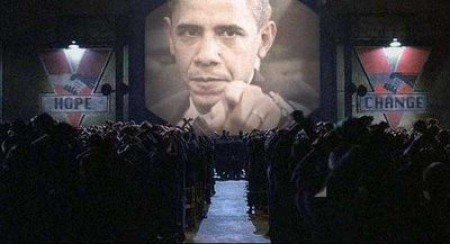– Big Brother Is Watching – New Emails Reveal Homeland Security Tracks License Plates At Gun Shows:
Newly discovered emails from the Department of Homeland Security (DHS), reveal efforts of the federal government to track American citizens who visit gun shows across the country. The discovery came via a Freedom of Information Act (FOIA) request from the Wall Street Journal that revealed internal emails from an Immigration and Customs Enforcement (ICE) agent requesting the support of local California police officers to “deploy license plate readers” at a 2010 gun show in Del Mar, California.
In an email titled “Request for Assistance,” an ICE investigator wrote, “We would like to see if you can support an outbound guns/ammo operation on (redacted) at the Crossroads (Del Mar) Gun Show. We would like to deploy license plate readers.” The email, whose sender and recipient are redacted, includes a large section of operational details that are also redacted.
According to the emails, the program was intended to collect license plate data from gun shows and then cross reference that data with border crossings in an attempt to identify gun runners. Of course, the program has drawn criticism from gun rights organizations across the country who argue that this form of mass surveillance draws undue suspicion to people who happen to engage in two completely legal activities.
Jay Stanley, a lawyer at the American Civil Liberties Union, said the gun-show surveillance “highlights the problem with mass collection of data.” He said law enforcement can take two entirely legal activities, like buying guns and crossing the border, “and because those two activities in concert fit somebody’s idea of a crime, a person becomes inherently suspicious.”
Erich Pratt, executive director of Gun Owners of America, said his group also opposes such surveillance. “Information on law-abiding gun owners ends up getting recorded, stored, and registered, which is a violation of the 1986 Firearm Owners Protection Act and of the Second Amendment,” Mr. Pratt said.
Of course, efforts to target gun owners is nothing new. Just last week we pointed out a new ballot measure being considered by voters in Washington state, officially referred to as Initiative Measure 1491, that would allow authorities to seize guns from people considered “significantly more likely to commit violence toward themselves or others in the near future” (see “WA Goes After Pre-Crime: Gun Confiscation Proposed For Those ‘Likely To Commit Violence In The Near Future’“). In most instances, seizing someone’s personal property on the mere suggestion of an ex-girlfriend would be considered outrageous but for gun owners our government seems to be increasingly willing make exceptions.
This type of data gathering continues to push the limits on how far the federal government is allowed to go in terms of mass surveillance before actually violating the constitutionally protected rights of American citizens to privacy.
License-plate readers are increasingly used by law-enforcement agencies as a way to search for fugitives, missing children, and, recently, the man who allegedly set off a bomb in New York City.
But their use at gun shows occupies a murky legal ground. While technology and data collection have greatly expanded the ability of government and companies to monitor citizens’ activity, U.S. courts, lawmakers, and senior officials have been slow to make clear what types of mass surveillance cross the line into violations of constitutional rights.
It has long been legal for police officers to record license plates they observe in the course of ordinary life. License-plate-reader technology, however, allows those observations to become mass-data collection. A single camera can record thousands of vehicle plates an hour, capturing the data at high speeds, in thick traffic and in other situations that the human eye cannot.
Boosters of the technology say it is a way to find a criminal in a sea of otherwise indistinguishable cars. Critics say that to find that criminal the government is tracking the movements of millions of innocent people—adding up to detailed surveillance of their daily lives and creating data that can be misused.
As the CEO of the “Crossroads of the West” gun show points out, the show attracted 6,000 – 9,000 customers who would probably “be resentful of having been the target of that kind of surveillance.”
Bob Templeton, the CEO of Crossroads of the West, which puts on the gun show, said he knew local police had been at the show, but was surprised to learn that federal agents had been gathering data about customers. The show at the Del Mar Fairgrounds typically draws 6,000 to 9,000 customers, meaning thousands of cars are in the parking lot, he said.
“It’s obviously intrusive and an activity that hasn’t proven to have any legitimate law-enforcement purpose,” said Mr. Templeton. “I think my customers would be resentful of having been the target of that kind of surveillance.”
So, just to clarify today’s events, the DHS can conduct mass surveillance of the American public just for choosing to attend a gun show butthe FBI has to sign a “side agreement” promising to physically destroy Cheryl Mills’ and Heather Samuelson’s computers before being able to review evidence in an actual criminal investigation?
* * *
PayPal: Donate in USD
PayPal: Donate in EUR
PayPal: Donate in GBP

In UK we now have ‘smart motorways” with number plate AND facial recognition cameras.
The benefit for crime investigation is indisputable.
The ability to monitor individuals and invade privacy is dubious at best and downright offensive at worst.
Soon, everyone will be wearing ANONYMOUS masks just to go to the mall.
I already insist on lowering my sun visor permanently, coz I just feel this surveillance is intrusive and protest accordingly.
http://massprivatei.blogspot.co.uk/2016/11/police-facial-recognition-cameras-being.html